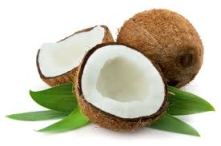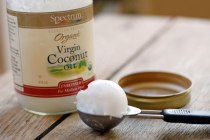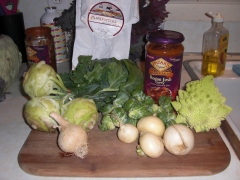 I used to hate coconut growing up, which led me to miss out on so many delicious treats (namely Samoas – oh, how many Girl Scout cookie seasons did I waste!). Then one day, my parents came home from a wedding with a giant piece of coconut creme cake, and I was instantly hooked. It was like crack. Nutritious crack. Only I didn’t know it at the time.
I used to hate coconut growing up, which led me to miss out on so many delicious treats (namely Samoas – oh, how many Girl Scout cookie seasons did I waste!). Then one day, my parents came home from a wedding with a giant piece of coconut creme cake, and I was instantly hooked. It was like crack. Nutritious crack. Only I didn’t know it at the time.
A few years ago, my former boss introduced me to the book The Vegetarian Myth by Lierre Keith. I highly recommend this book to anyone even remotely interested in nutrition; this book changed my life, setting me down the path of amateur investigative health journalism. It also reintroduced me to coconut; or rather, introduced me to coconut’s healthy side.
In her book, Keith addresses many of the nutritional lies Big Ag has spread to nourish America’s reliance on cheap, processed foods. One of which is the Lipid Hypothesis, or the claim that saturated fats lead to high blood pressure which leads to heart disease. Fats are actually an extremely important part of your diet, but only the good fats. And, despite the claims of Big Ag’s health experts, saturated fats are on that list, along with monounsaturated fats – both of which are found in abundance in coconut oil. It’s the polyunsaturated fats you have to look out for; those pesky vegetable oils that are touted as “heart healthy” actually cause a world of problems – including heart disease. Keith breaks down the science of fats in her book (starting on page 179 for those interested) but here’s the quick version: fatty acids are chains of carbon atoms with hydrogen atoms attached. Saturated fats, like butter, coconut oil, and palm oil, have a hydrogen in every available bond, so they form a straight line and are stable at all temperatures; monounsaturated fats, like olive, avocado, or peanut oil, are missing two hydrogens, so they have a slight bend but are still stable; and polyunsaturated fats, which come from vegetable oils  like corn, soy, safflower, sunflower, and canola, are missing four or more hydrogens and are extremely unstable, meaning they go rancid when heated. These PUFAs contribute to a long, long list of health issues, including many types of cancer, organ damage, heart disease, immune system deterioration, neurological disorders, and digestive problems. So… why do we cook with them?
like corn, soy, safflower, sunflower, and canola, are missing four or more hydrogens and are extremely unstable, meaning they go rancid when heated. These PUFAs contribute to a long, long list of health issues, including many types of cancer, organ damage, heart disease, immune system deterioration, neurological disorders, and digestive problems. So… why do we cook with them?
Keith cites several studies done by Weston Price and other researchers on the diets and overall health of indigenous peoples. All of these peoples – including Eskimos, Aborigines, African tribes, and other peoples whose diets had not been contaminated by modern processed foods – had little to no instances of cancer, heart disease, osteoporosis, or other “diseases of civilization.” Their diets comprised of animal products, some vegetables, very few if any grains, and lots of saturated fats. Say hello to the original Paleo Diet.
One ounce of coconut oil contains about 24g of saturated fats, 1.5g of monounsaturated fats, and .5g of polyunsaturated fats; among those goods fats is a large amount of lauric acid, which has powerful antimicrobial, antiviral, and antibacterial properties. In addition to not causing a laundry list of health problems, these good fats can do a lot of, well, good. The antiviral and antibacterial properties of lauric acid help fight infections and diseases, and its high concentration of good fats helps fight many neurological and degenerative diseases. The Coconut Research Center lists the many benefits of coconut oil, but here are a few:
-used topically to cure skin problems such as acne, psoriasis, dry skin, dandruff, and wounds
-great for the hair as well (I use it as a deep conditioning treatment about once a month or so)
-its antibacterial properties make it a great deodorant (you can easily make your own with it, or use coconut oil-based products like Truly’s, which is what I use)
-helps reduce the risk and symptoms of diabetes and heart disease
-has recently been shown to stop and even reverse Alzheimers by feeding the brain with its good fats
-fights viruses that cause influenza, STDs, measles, hepatitis C, SARS, AIDS, the flu and other illnesses
-gives you a great, healthy energy boost when added to smoothies, tea, etc. (I always add a tablespoon or so to my hot chocolate or coffee to make it extra rich and creamy)
-controls hunger and boosts metabolism, so it’s a great tool to use in any diet plan, plus it improves digestion, helping you absorb more nutrients
-when used for oil pulling, it detoxes your body of harmful bacteria and improves oral health (I started oil pulling a few days ago, and I will let you know how it goes soon!)
 So next time you have stir fry or curry for dinner, use coconut oil instead of vegetable oil. (Also, use some of Pappardelle’s Spicy Thai pasta – it’s fabulous!) It won’t give you cancer, and it will make your food taste fabulous. After all, why coat your delicious, nutritious veggies with tasteless, toxic vegetable oil?
So next time you have stir fry or curry for dinner, use coconut oil instead of vegetable oil. (Also, use some of Pappardelle’s Spicy Thai pasta – it’s fabulous!) It won’t give you cancer, and it will make your food taste fabulous. After all, why coat your delicious, nutritious veggies with tasteless, toxic vegetable oil?
Oh, and check out Delicious Obsessions’ 122 uses for coconut oil. There are indeed some downright odd uses for nature’s miracle oil, including using it to clean showers and heal new tattoos.